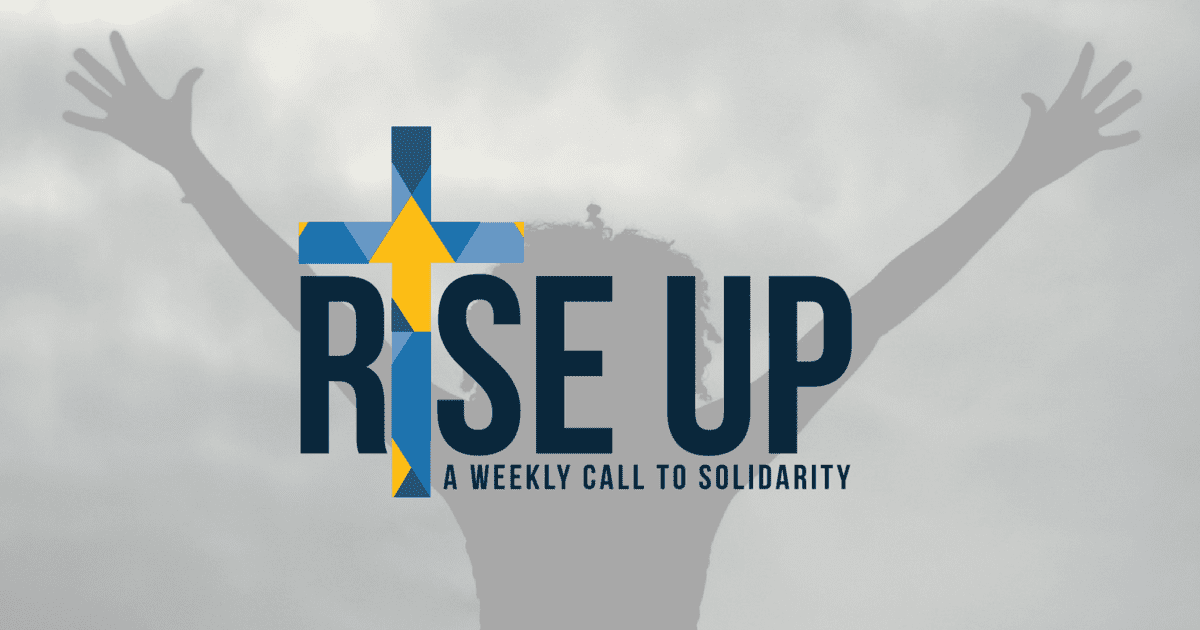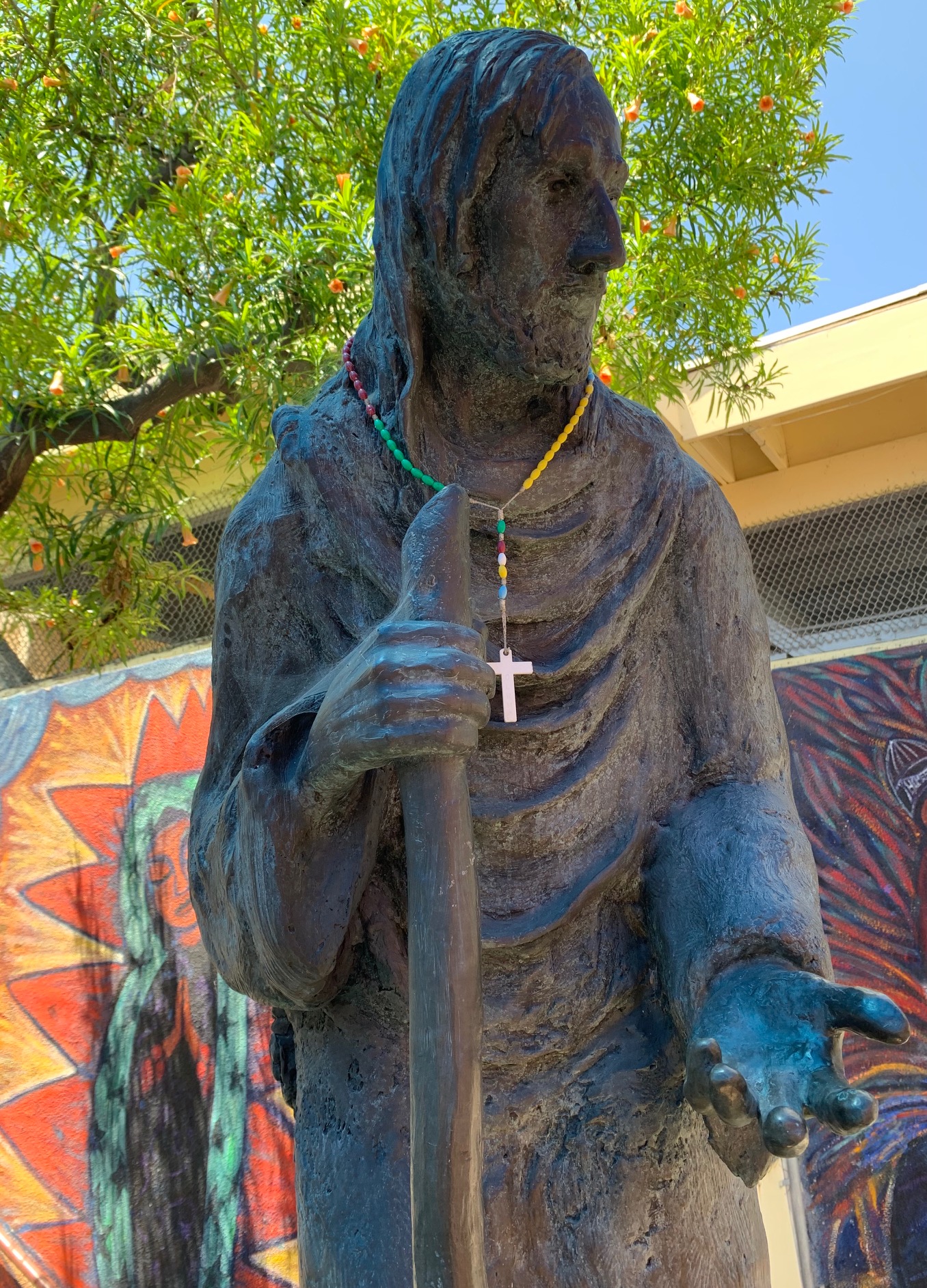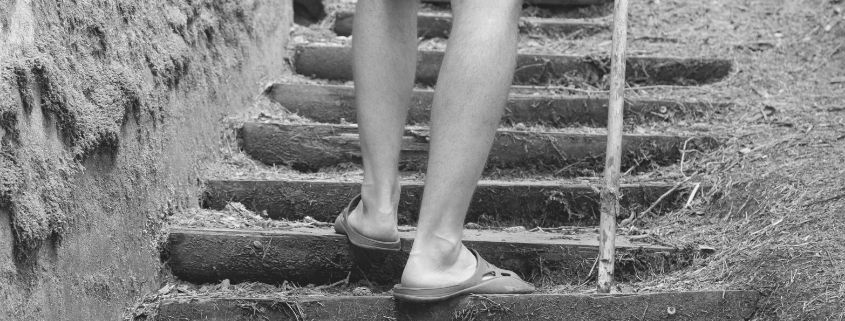Relying on God for the Journey
BY ELLIE HIDALGO | July 12, 2021
Sunday’s Readings

Take nothing for the journey but a walking stick and sandals, Jesus tells the twelve. No food, no sack, no money, not even a second tunic. What is unspoken is that in surrendering the comfort of their own self-reliance, the twelve have to take the risk to rely totally on God’s providence through the generosity and mercy of those they encounter on their journey. Perhaps it is this total reliance on God and on others that paradoxically unleashes the Holy Spirit’s power to spread the Good News through these twelve and to bring about healing to many people. Mutual reciprocity. Trinity relational theology.
 St. Ignatius of Loyola also wanted to experience radical reliance on God during his early conversion when he lived as a beggar in the streets for several years. While most images of Ignatius depict him writing in a scholarly context, a rare statue of Ignatius as a pilgrim beggar on the plaza of Dolores Mission Church in Boyle Heights/East Los Angeles shows him with a walking stick and an empty hand outstretched to God and to the world. This statue was commissioned to honor the men who have traveled through and slept in the church, having been welcomed by Guadalupe Homeless Project. Looking at Ignatius’ outstretched empty hand, I see that with less to carry, his hand is open to receive, his heart is open to encounter. Disordered attachments are released and the soul is open to healing and to the new movement of the Holy Spirit.
St. Ignatius of Loyola also wanted to experience radical reliance on God during his early conversion when he lived as a beggar in the streets for several years. While most images of Ignatius depict him writing in a scholarly context, a rare statue of Ignatius as a pilgrim beggar on the plaza of Dolores Mission Church in Boyle Heights/East Los Angeles shows him with a walking stick and an empty hand outstretched to God and to the world. This statue was commissioned to honor the men who have traveled through and slept in the church, having been welcomed by Guadalupe Homeless Project. Looking at Ignatius’ outstretched empty hand, I see that with less to carry, his hand is open to receive, his heart is open to encounter. Disordered attachments are released and the soul is open to healing and to the new movement of the Holy Spirit.
St. Phoebe is another pilgrim traveler who relies on God’s grace to fulfill her mission. St. Paul writes a letter, and entrusts it to Phoebe, a deacon, to travel from her faith community in Cenchreae to Rome to lay the groundwork for Paul’s future visit (Romans 16:1-2). In this way Paul and Phoebe collaborate together to nurture and grow emerging early Christian faith communities—for nothing is impossible with God.
In our times, how we are invited to better care for our common home and for each other by becoming a little less self-reliant and accumulating fewer things and becoming a little more trusting in the Holy Spirit and in one another? We might find that delight awaits as we witness the Holy Spirit working through each one of us in ways that surprise us and deepen our belonging and connectedness.
Ellie Hidalgo is co-director of Discerning Deacons, a project to engage Catholics in the active discernment of our Church about women in the diaconate and to contribute to the renewal of the diaconate for our times. Previously, she served as pastoral associate at Dolores Mission Church and School in Boyle Heights/East Los Angeles, CA. Ellie received her master’s in pastoral theology from Loyola Marymount University in Los Angeles. She is based in Miami, FL.









Our connectedness is certainly of importance to all of us as we recover from the pandemic and realize that we truly need each other to survive and to call on the Holy Spirit to assist us. I truly believe we should know each others’ names so that we can direct our thoughts to the one who is asking or is inspirational during our daily tasks. Out of chaos God created us, out of mercy, justice and peace we continue to bring the kingdom of God to fruition.
The violence so prevalent in our society can be tapered by our willingness to be respectful to all in the community. It is from this respect comes an undying love for each other and leads to the fostering of peace throughout our communities. Personal, individual prayer is important but our communal prayer helps all to realize God’s goodness to all.
Ellie calls for us to take care of our common home by using less, having less possessions and respecting people but also the beauty and joy of the land. it is focusing on these issues that as a community we bring that goodness and kindness to all.
My appreciation and admiration to Ellie for this practical reflection that we can apply in our daily lives. Dad
Thanks Ellie Hidalgo for the very meaningful stuff. Pilgrims St. Ignatius of Loyola and St. Phoebe – Pray for us.